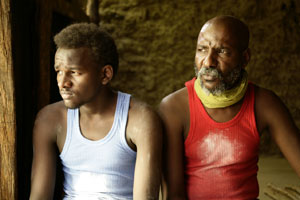 ALI BARKAI, YOUSSOUF DJAORO IN DARATTA cold dish in a hot climate
ALI BARKAI, YOUSSOUF DJAORO IN DARATTA cold dish in a hot climateLike Koreeda's
Hana, Haroun's
Daratt is another new filmed tale about delayed revenge, but a very different and much more powerful one. Atim (Ali Barkkai), whose father was murdered in the aftermath of Chad's civil war, goes out to avenge his father's killer after a general amnesty is declared. His plans change when in order to carry out his task he goes to work at the killer's bakery. While Koreeda's Soza is timid and doubtful and lives with a lot of other people, Atim is virtually alone and perpetually angry and seems ready to kill at any moment.
Revenge is a dish best enjoyed cold means it's not a crime of passion but of premeditation. Into that premeditation play not only a personal sense of wrong but often hereditary cultural rules governing loyalty to tribe, clan, family, or parent. It seems unlikely anyone would feel obligated to carry out an act of revenge (as both Soza and Atim do) without cultural input requiring it; and since traditional values are in a state of flux or devolution, the motivation may wane. This must explain the arcs of both
Hana and
Daratt. Soza of
Hana feels an obligation to his clan, which however his own nature rejects; he's a gentle soul who would rather teach calligraphy than practice his dubious swordsmanship skills -- which don't seem to translate well from the
dojo to the street. Atim is directed by his ancient, blind grandfather to avenge his father's death. It seems almost a religious duty, and in some folk interpretations of Islam such obligations are given a religions sanction. In fact, though, when Atim arrives at the unidentified town where his "victim" lives and begins working for his father's killer, he refuses to go to the mosque with him, perhaps sensing that subjugation to the will of God might dampen his sense of purpose, or because he realizes his bloody mindedness ill fits a religion whose greeting is "peace be upon you."
Daratt's fable-like quality arises from its forceful simplicity. Each character has some iconic function. Atim's grandfather Gumar Abatcha (Khayar Oumar Defallah) acts as a relentless force of judgment. The soldier who is nasty to Atim on his trip (Abderamane Abakar) is a minor wrong-doer, who disrespects Atim, which also must be avenged. Upon arrival Atim's befriended by an amiable petty thief, Moussa (Djibril Ibrahim), who helps him get established in town, but whom he summarily abandons once he narrows in on his task. When we first see Nassara (Youssouf Djaoro), the man who killed Atim's father, it's obvious he is more important. He looks like a priest. He is a tall, thin man in a robe with a scarf around his neck and a distant, ascetic air -- off-putting, but not easy to despise on sight -- and he appears at a gate with a bag full of bread scraps that he distributes to poor boys who come to him with tin plates. This happens several times, and then Atim goes up to Nassara. Everything about Atim from first to last suggests inarticulate rage. One would say his performance was one-note were it not so strong and convincing. He takes the proffered hunk of bread, bites out of it, then spits it out. The man says if he wants work, to come back tomorrow. Nobody talks much in the film. In fact Nassara has had his throat slit during the war and has to hold a gadget up to his neck to be able to say anything.
The strength of the film comes from its tension and suspense, from the accumulating power of things left unexplained. It is never obvious, right up to the last scene, what Atim is going to do. When he stays with Nassara and is befriended uneasily by his young wife Aicha (Aziza Hiseine) and begins to work for him, it's not clear why. Is he biding his time to achieve maximum surprise? Or is he simply hesitating? Moreover while evidently Nassara is becoming fond of the young man, it's hard to say whether Atim is liking him more or feeding his hate. Certainly the situation is complicated by the fact that in some strange way Nassara has become a surrogate father figure for Atim (an outcome recalling events in the Dardennes brothers'
The Son), but also because, when Nassara's back is killing him and he lets Atim do all the baking, it delights Atim to accomplish this task with success. Nassara like Atim is silent and seems full of anger, further linking the two men, young and old, in an uneasy embrace. One of the most vivid ever portraits on film of prolonged, inarticulate rage,
Daratt is also a more emotionally intense and convincing depiction than Koreeda's
Hana of how someone bent on revenge might waver painfully over the task.
Daratt is a fascinating, powerful tale. Its intensity, its vividness, its simplicity, even the dry heat of the setting, all conspire to make for a riveting film.
Shown as part of the San Francisco International Film Festival 2007.
SHOWTIMES
Sun, Apr 29 / 02:45 / SFMOMA /
Mon, Apr 30 / 01:15 / Kabuki /
Fri, May 4 / 07:00 / PFA /





